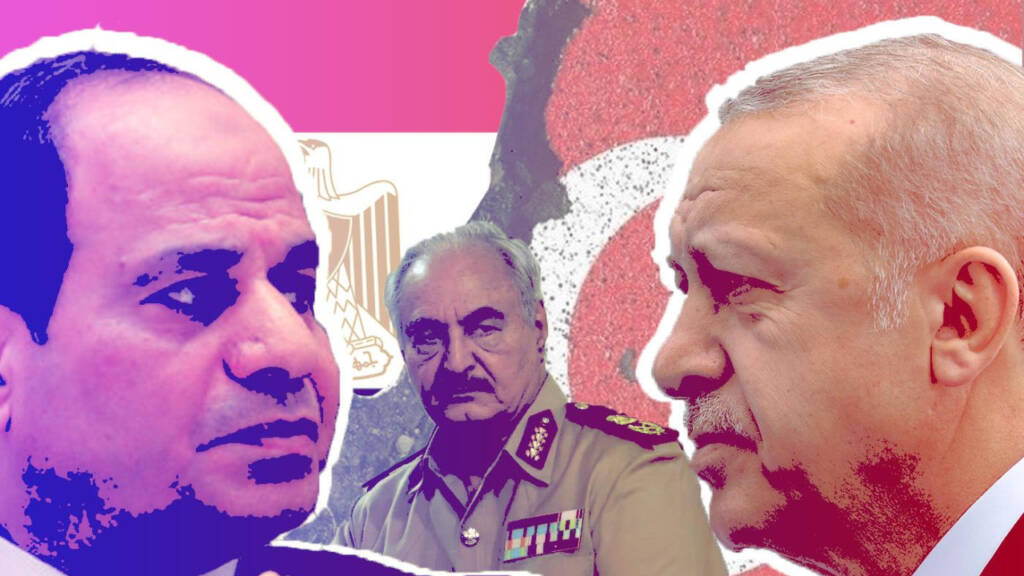Turkey-Egypt proxy war: Since 2011, Libya has been in the midst of a massive political and security crisis. The country turned into a failed state following the fall of Gaddafi, who was overthrown in 2011 and was aided by a NATO-led bombing campaign.
Subsequently, the country was split into two rival governments one in the east, led by Haftar and an administration based in Tripoli, which is internationally recognised and backed by the West.
The involvement of foreign powers and consequent proxy wars in Libya has so far only made the political situation in the country more complicated. However, new possibilities are around the corner for Libya as the Turkey-Egypt proxy war seems to be getting over.
Turkey & Egypt to co-operate more closely on Libya
As per a recent report, Turkey and Egypt may be moving towards a more co-operative relationship, which could have significant implications for the ongoing conflict in Libya.
The Turkish Foreign Minister Mevlut Cavusoglu, has said that Ankara and Cairo will co-operate more closely regarding Libya, marking another step in the rapprochement between the two regional powers.
The Turkish Foreign Minister Cavusoglu’s comments have come as the two countries work to mend ties after being at odds for a decade. The two countries had cut diplomatic links following the overthrow of Egypt’s then-president and Ankara ally Mohamed Mursi.
Among the disputes between the two countries is the conflict in Libya. However, after years of a strained relationship, the two countries have shown interest in mending ties of late. As part of these efforts, Cavusoglu visited Cairo last month while Egypt’s Foreign Minister Sameh Shoukry previously came to Turkey to show solidarity after February’s massive earthquakes that killed more than 50,000 people in Turkey and Syria.
The efforts to rebuild ties have culminated now in the two countries promising to co-operate on the Libya issue.
While speaking on the issue, Cavusoglu said during a news conference in Ankara that the two countries’ “views are not essentially very different but that we think differently on some methods”.
He further said that the two countries will work on a roadmap to hold elections in Libya and can work on training and reinforcing a joint military between forces in the east and west of Libya.
On the other hand, the Egyptian foreign minister Shoukry agreed that Egypt too shares a common desire with Turkey to hold elections in Libya.
In another positive development, the Foreign Ministers of the two countries also said that the two countries would take steps to re-appoint ambassadors and hold a summit between their leaders.
Turkey-Egypt proxy war over Libya
Turkey and Egypt have had a strained relationship as they back the opposing sides in Libya. The two countries have been at odds for over a decade. In the conflict, Turkey has backed the Tripoli-based Government of National Accord and had also helped it to repel renegade military commander Haftar’s attempt to storm the capital. Egypt on the other hand, backs the Libyan National Army (LNA) led by Haftar.
Moreover, Egyptian President Al-Sisi, the then army chief, had led the 2013 ousting of Mohamed Mursi of the Muslim Brotherhood, who was strongly supported by Erdogan.
Read More: US backed Tripoli government begs for recognition
The Egypt-Turkey conflict has also stemmed from the desire to maintain their influence in Libya. Turkey wants to secure a greater role for itself in the planned exploration for natural resources in the Mediterranean, and is seeking to weaken the anti-GNA forces of Khalifa, who is backed by Egypt.
The strategic disagreement between Egypt and Turkey over Libya also includes a maritime dispute, various military concerns and ideological differences over Islam and politics.
However, in recent times, the longstanding rift between Egypt and Turkey has shown signs of reconciliation.
Libya: Turkey & Egypt mending ties
During last year’s World Cup, President Abdul Fattah al-Sisi met with President Recep Tayyip Erdogan in Qatar. And after the earthquake, Al-Sisi was among the first leaders to convey condolences to President Erdogan over the catastrophe and promised aid.
Not just this, in a follow-up move, Egyptian prime minister Mostafa Madbouly hosted a group of Turkish businesspeople in Cairo on February 15, 2023, to discuss planned investments of $500 million—the first such meeting in a decade. As per reports, Egypt is in the process of privatizing several state-run firms, and Turkey could play a role in that process alongside heavy investments by Gulf states.
Other factors could also contribute to a Turkey-Egypt reconciliation. Post the earthquake, the Turkish government’s preoccupation with rescue and relief efforts may affect its policy on Libya. Turkish investments in Libya may be curtailed as infrastructure companies begin to focus on post-earthquake reconstruction.
For Egypt, the motivation to help stabilise Libya may come from its increasingly dire economic crisis back home, which includes extreme currency devaluation, inflation and shortage of basic goods. Further, Cairo may also want to reap the economic benefits of a stable Libyan government, in the form of hundreds of thousands of jobs for Egyptian workers, as was the case before the 2011 revolution.
Libya hasn’t had much peace since 2011 and the political process to resolve the conflict has been stalled since the collapse of a scheduled election in December 2021, over disputes about the rules.
Often the involvement of foreign powers has also complicated matters. Turkey-Egypt proxy war in Libya too has gone on for long, however, now the changing dynamics between Egypt and Turkey may offer opportunities for peace in Libya. With these two countries showing signs of reconciliation, it is now up to the international community to support the efforts towards peace and stability in Libya. However, the conflict in Libya is complex, that involves a range of domestic and international actors with competing interests. The Egypt-Turkey reconciliation is certainly a positive sign against all the odds, which may have significant implications for the Libyan peace process.
https://www.youtube.com/watch?v=Q2NQbQRVWRI
